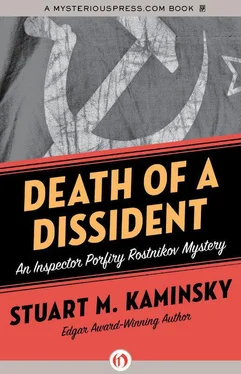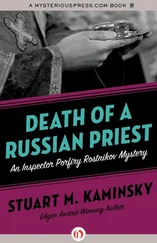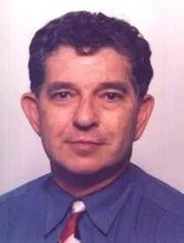Stuart Kaminsky - Death of a Dissident
Здесь есть возможность читать онлайн «Stuart Kaminsky - Death of a Dissident» весь текст электронной книги совершенно бесплатно (целиком полную версию без сокращений). В некоторых случаях можно слушать аудио, скачать через торрент в формате fb2 и присутствует краткое содержание. Год выпуска: 2012, ISBN: 2012, Жанр: Полицейский детектив, на английском языке. Описание произведения, (предисловие) а так же отзывы посетителей доступны на портале библиотеки ЛибКат.
- Название:Death of a Dissident
- Автор:
- Жанр:
- Год:2012
- ISBN:9781453266298
- Рейтинг книги:4 / 5. Голосов: 1
-
Избранное:Добавить в избранное
- Отзывы:
-
Ваша оценка:
- 80
- 1
- 2
- 3
- 4
- 5
Death of a Dissident: краткое содержание, описание и аннотация
Предлагаем к чтению аннотацию, описание, краткое содержание или предисловие (зависит от того, что написал сам автор книги «Death of a Dissident»). Если вы не нашли необходимую информацию о книге — напишите в комментариях, мы постараемся отыскать её.
Death of a Dissident — читать онлайн бесплатно полную книгу (весь текст) целиком
Ниже представлен текст книги, разбитый по страницам. Система сохранения места последней прочитанной страницы, позволяет с удобством читать онлайн бесплатно книгу «Death of a Dissident», без необходимости каждый раз заново искать на чём Вы остановились. Поставьте закладку, и сможете в любой момент перейти на страницу, на которой закончили чтение.
Интервал:
Закладка:
“You lived on a farm before all this,” said Rostnikov.
“That was a long time ago,” said Malenko. “Eighteen, twenty years ago.”
“That was where your child was killed by your wife?”
“Yes,” said Malenko, unable to keep up his false front and glaring at the policeman.
“Where is that farm?”
“North of the city, beyond Druzhba. A farmer named Breask or something like that owns it. Why do you ask?”
“I think,” said Rostnikov, “that your son may be heading there. I think he may have kept some tools of yours from that farm and is now using them to kill people, kill people who he thinks betrayed him. Does that make sense to you?”
“No,” said Malenko, his dark face turning pale.
The four other men in the room looked at the two antagonists in confusion.
“He has a young girl with him,” said Rostnikov. “Give me complete directions for getting to the farm, and give them to me quickly.”
Rostnikov handed a notebook and pencil to Malenko, who sketched a map and handed it back to the policeman.
“Thank you. Would you like to come?”
“No,” said Malenko sitting back down. “I…no.”
Rostnikov turned and left the room.
Tkach and Zelach had found the abandoned car with the help of directions from Vera Alleyanovskya. Forty minutes later they found the trail of footprints in the snow. It was faint and had been obscured here and there by falling and drifting snow, but it could be followed.
“This is ridiculous,” mumbled Zelach an hour later. Their car had been left on the road behind Vera Alleyanovskya’s vehicle, and with each step they moved further and further from it.
“But necessary,” replied Tkach, moving forward.
An hour later they found the farmhouse where Malenko and the girl had stopped and they found the reluctant farmer.
“I’ll talk,” Tkach whispered to Zelach as they approached the man who stood in the door, axe in hand.
“Comrade,” shouted Tkach, letting a sob enter his voice. “We are looking for my little sister. She was taken by force by a man she doesn’t want to marry. We have reason to believe he brought her this way.”
“Go to the police,” the farmer said, fingering his axe.
“The police,” cried Tkach. “I want nothing to do with the police. This is a private matter, a matter of honor.”
“The police are trouble,” agreed the farmer looking suspiciously at Zelach.
“My brother,” Tkach explained.
The man nodded.
“The man looked a bad sort,” the farmer said. “Girl did look frightened. He asked me how to get to a village near here. Come in. I’ll tell you where he went.”
“Michael Veselivitch Dolguruki,” sighed Rostnikov, “you are an outstanding driver. I applaud your skill under difficult conditions, but we can do the girl no good if we do not arrive at our destination.”
The police Volga had careened down the highways and back roads into the late afternoon. On one occasion the car had come very near overturning on a skid. On another occasion, a remarkably fat woman had to leap off the road in front of the car with a dexterity that made Rostnikov blink with wonder.
“I’m sorry, Inspector,” Dolguruki said, keeping his eyes on the road, “but I thought you told me to hurry.”
“Hurry, hurry,” sighed Rostnikov, waving his hand in the air.
Rostnikov was worried about the girl, true, but he was also worried about how he might explain the destruction of the automobile. His body and that of the driver could be repaired by doctors. Doctors in Moscow were good and there would be no cost. But to repair an automobile. Ah, thought, Rostnikov, that may be much more difficult.
With that thought, another car joined them on the narrow road and slid in front of them. Rostnikov’s driver hit his brakes and went into a skid that appeared certain to result in crash into the second car. Rostnikov sucked in his breath, braced himself with his good leg, and gripped the door handle. The second car had stalled in front of them, and slow motion took over Rostnikov’s consciousness. His car moved as if through water. The movement took the length of a war and the time of a sneeze, but ended without a collision.
Rostnikov and his driver leaped out to confront the other car’s occupants. There was no more than an inch or two between the cars.
“Tkach!” Rostnikov shouted, watching his breath form a cloud.
“Inspector! ” shouted Tkach back as he stepped out of his car. Behind the young detective, Rostnikov could see the outline of Zelach. “We know the village where Malenko has taken the girl.”
“And you think I am just riding around out here to witness the magnificent efforts of farmers preparing their futures?” sighed the inspector.
“No, I-” began Tkach.
“Never mind,” Rostnikov interrupted. “Let’s turn your car and get it going in the right direction. “Zelach,” he shouted, “get behind the wheel. We’ll push.”
Rostnikov, Tkach, and the driver pushed the car as Zelach gently started the engine. Its rear was firmly locked in a bank of snow blocking the road.
“Out of the way,” Rostnikov shouted, pushing Tkach and Dolguruki. You, Zelach, out of the car.”
“You have an idea, Inspector?”
“I have a challenge,” Rostnikov grinned, but it was a grin without joy. Zelach scampered out of the car and joined them in the road. Far off the road was a house with a chimney puffing little clouds of grey smoke. Somewhere in the distance across the reaches of snow a cow bellowed, and on the road Rostnikov moved to the rear of the stalled car. He took off his gloves, rubbed his hands on his coat, concentrated, took three deep breaths, held the last and put his hands under the bumper. With knees bent and back straight, he began to lift, his face turning red with the effort, a dry chill freezing moisture on his nose. He imagined the extra weights he had been unable to purchase. He imagined himself at the park championships lifting for the first place medal, he imagined himself at the Olympic games breaking a world record, and he rose. He could feel the pressure in his groin and knew his bad leg was wobbling dangerously, but he rose. The rear of the car came up and he pushed forward, letting it go. The car bounced twice and rested free of the snow bank. Rostnikov gasped for air and tried to speak to cap his moment, but it was difficult to get the words out. Instead, he slumped forward and put one hand against the now free car and pulled in short gulps.
“Don’t…stand…Let’s get going.” He waved his hand violently at the three men who watched him. Dolguruki, the driver, was the first to respond. He hurried to his car. Tkach and Zelach moved quickly into their car, and Rostnikov stood up to allow them to pull away. As they started up the road, Rostnikov shuffled back to his Volga and got in the front next to Dolguruki.
“You are deceptively strong, Inspector,” said the driver starting the car. The car in front of them was clearly in sight.
“Is that a compliment?” asked Rostnikov, damning himself for being unable to catch his breath.
“Of course,” said the driver.
Rostnikov shrugged.
Fifteen minutes later, both cars pulled into the village of Svenilaslav. The village itself was only slightly larger than a small farm and consisted of one two-story village store, a government grain trading center and a small brick one-story building that served as the village center.
Inside the brick building, Andrei Froskerov, who had recently celebrated his eighty-first birthday, was trying to decide if he was going to steal one of the chairs from the meeting room. He had stolen one a year earlier and sold it ten miles away to an engineer, but Comrade Scort had looked at him suspiciously for months. Not having been caught had given Andrei Forskerov courage. Besides, the engineer had told him that he could use a matching chair. He might even pay a few hundred kopecks. Froskerov was alone in the building, as he often was. His task was to keep it clean, which he did, and to protect village property, which he did not do.
Читать дальшеИнтервал:
Закладка:
Похожие книги на «Death of a Dissident»
Представляем Вашему вниманию похожие книги на «Death of a Dissident» списком для выбора. Мы отобрали схожую по названию и смыслу литературу в надежде предоставить читателям больше вариантов отыскать новые, интересные, ещё непрочитанные произведения.
Обсуждение, отзывы о книге «Death of a Dissident» и просто собственные мнения читателей. Оставьте ваши комментарии, напишите, что Вы думаете о произведении, его смысле или главных героях. Укажите что конкретно понравилось, а что нет, и почему Вы так считаете.












